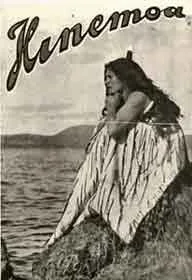The first public screening of motion pictures in New Zealand took place at the Opera House, Auckland on 13 October 1896. This issue was created to mark that event. What is of interest to me is the subject on the stamps. I have already completed posts on other films made in New Zealand and over the next few months I plan to do more so I decided to feature this set of four stamps depicting early New Zealand films.
 "The first big dramatic work filmed and acted in the land of the Moa," was Hinemoa (1914), New Zealand's first feature.
"The first big dramatic work filmed and acted in the land of the Moa," was Hinemoa (1914), New Zealand's first feature.On a budget of £50, George Tarr directed Hinemoa over eight hectic days in Rotorua. Hera Tawhai and her husband Rua starred along with the Rev. Bennett's Maori Choir Party. With the film almost complete but the budget gone, George Tarr headed to Auckland to show it to his investors and distributor Mr Hayward. They loved it. The film was completed and Hinemoa premiered in the first week of World War 1 and did big business. Sadly there are no remaining prints of the movie, but this promotional image has survived.
Each night she would sit by the shore and listen to the music of his flute as he played to her across the water. One day she decided she must be with him so casting her cloak aside, naked she entered the cold dark water in the night and swum to him. He found her resting, recovering from the cold in one of the warm pools on the Island.
There are various versions of this story from tribes around the country but the movie appears to have been based on the version from Rotorua where Hinemoa swum from the shore to the island in the middle of the lake.
The Legend of Hinemoa. - Rotorua's famous romance story of forbidden love.
Promotional and advertising material from the Movie.
Broken Barrier - 80c
 Broken Barrier is a 1952 New Zealand film. It was directed and produced by John O'Shea (director) and Roger Mirams, and written by O'Shea. It starred Kay Ngarimu and Terence Bayler.
Broken Barrier is a 1952 New Zealand film. It was directed and produced by John O'Shea (director) and Roger Mirams, and written by O'Shea. It starred Kay Ngarimu and Terence Bayler. John O'Shea, says that at the time it was considered by many to be controversial. The film was built around the story of a romance between a young Pakeha (caucasian) journalist and a young Maori woman, a subject which was not tolerated by many quarters of New Zealand society at the time.
The Story:-
Tom Sullivan meets Rawi while researching articles on rural Māori life, and he stays for a time with Rawi's family. Rawi's family disapproves of her relationship with a Pakeha man, ending in a quarrel.
Later, however, the two are re-united in the city, where Rawi goes to work as a nurse. The two resume their romance, but this time meet with opposition from Tom's family and friends, who do not wish him to be involved with a Māori woman. Tom eventually comes to agree with their views, and the couple separate once again.
Tom has a change of heart, however, when he saved from a fire by a Māori friend's sacrifice. Tom and Rawi are reunited.
Goodbye, Pork Pie - $1.50
 Goodbye Pork Pie is a 1981 New Zealand film directed by Geoff Murphy and written by Geoff Murphy and Ian Mune. The film is considered to be one of New Zealand's most popular films. It stared Tony Barry as John, Kelly Johnson as Gerry Austin, Claire Oberman as Shirl, Shirley Gruar as Sue and Bruno Lawrence as Mulvaney.
Goodbye Pork Pie is a 1981 New Zealand film directed by Geoff Murphy and written by Geoff Murphy and Ian Mune. The film is considered to be one of New Zealand's most popular films. It stared Tony Barry as John, Kelly Johnson as Gerry Austin, Claire Oberman as Shirl, Shirley Gruar as Sue and Bruno Lawrence as Mulvaney. It was released in 1981 to rave reviews throughout New Zealand. Overseas audiences also enjoyed it. For its time it was the most successful New Zealand film offered to the international market.
Once were Warriors - $1.80
 Once Were Warriors is New Zealand author Alan Duff's bestselling first novel, published in 1990. It tells the story of an urban Māori family, the Hekes, and portrays the reality of domestic violence in New Zealand. It was the basis of a 1994 film of the same title, directed by Lee Tamahori and starring Rena Owen and Temuera Morrison. The novel was followed by two sequels, What Becomes of the Broken Hearted? (1996) and Jake's Long Shadow (2002).
Once Were Warriors is New Zealand author Alan Duff's bestselling first novel, published in 1990. It tells the story of an urban Māori family, the Hekes, and portrays the reality of domestic violence in New Zealand. It was the basis of a 1994 film of the same title, directed by Lee Tamahori and starring Rena Owen and Temuera Morrison. The novel was followed by two sequels, What Becomes of the Broken Hearted? (1996) and Jake's Long Shadow (2002).The movie became the highest grossing New Zealand movie ever, exploded onto screens in 1994. With its central theme of domestic violence and abuse, it is a disturbing and contentious film. The film's violence was an attempt to offer an understanding of the causes of the conflict.
Personally I did not particularly enjoy this film although I think it achieved what it set out to do in a very successful way.
Some of the images in this post were used with permission from the illustrated catalogue of StampsNZ
You can visit their web site and On-line Catalogue at, http://stampsnz.com/


